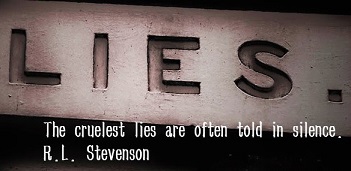“Omission is the most powerful form of lie.” – George Orwell

I am asked occasionally why I am so critical of the mainstream media when I quote from them repeatedly in my writings. The answer is simple. The American media’s gravest shortcoming is much more their errors of omission than their errors of commission. It’s what they leave out that distorts the news more than any factual errors or out-and-out lies. So I can make good use of the facts they report, which a large, rich organization can easier provide than the alternative media.
A case in point is a New York Times article of October 5 on the Greek financial crisis and the Greeks’ claim for World War Two reparations from Germany.
“Germany may be Greece’s stern banker now, say those who are seeking reparations,” writes the Times, but Germany “should pay off its own debts to Greece. … It is not just aging victims of the Nazi occupation who are demanding a full accounting. Prime Minister Antonis Samarass government has compiled an 80-page report on reparations and a huge, never-repaid loan the nation was forced to make under Nazi occupation from 1941 to 1945. … The call for reparations has elicited an emotional outpouring in Greece, where six years of brutal recession and harsh austerity measures have left many Greeks hostile toward Germany. Rarely does a week go by without another report in the news about, as one newspaper put it in a headline, ‘What Germany Owes Us’.”
“The figure most often discussed is $220 billion, an estimate for infrastructure damage alone put forward by Manolis Glezos, a member of Parliament and a former resistance fighter who is pressing for reparations. That amount equals about half the country’s debt. … Some members of the National Council on Reparations, an advocacy group, are calling for more than $677 billion to cover stolen artifacts, damage to the economy and to the infrastructure, as well as the bank loan and individual claims.”
So there we have the morality play: The evil Germans who occupied Greece and in addition to carrying out a lot of violence and repression shamelessly exploited the Greek people economically.
Would it be appropriate for such a story, or an accompanying or follow-up story, to mention the civil war that broke out in Greece shortly after the close of the world war? On one side were the neo-fascists, many of whom had cooperated with the occupying Germans during the war, some even fighting for the Nazis. Indeed, the British Foreign Secretary, Ernest Bevin, acknowledged in August 1946 that there were 228 ex-members of the Nazi Security Battalions – whose main task had been to track down Greek resistance fighters and Jews – on active service in the new Greek army. 1
On the other side was the Greek left who had fought the Nazis courageously, even forcing the German army to flee the country in 1944.
So guess which side of the civil war our favorite military took? … That’s right, the United States supported the neo-fascists. After all, an important component of the Greek left was the Communist Party, although it wouldn’t have mattered at all if the Greek left had not included any Communists. Support of the left (not to be confused with liberals of course) anywhere in the world, during and since the Cold War, has been verboten in US foreign policy.
The neo-fascists won the civil war and instituted a highly brutal regime, for which the CIA created a suitably repressive internal security agency, named and modeled after itself, the KYP. For the next 15 years, Greece was looked upon much as a piece of real estate to be developed according to Washington’s political and economic needs. One document should suffice to capture the beauty of Washington’s relationship to Athens – a 1947 letter from US Secretary of State George Marshall to Dwight Griswold, the head of the American Mission to Aid Greece, said:
During the course of your work you and the members of your Mission will from time to time find that certain Greek officials are not, because of incompetence, disagreement with your policies, or for some other reason, extending the type of cooperation which is necessary if the objectives of your Mission are to be achieved. You will find it necessary to effect the removal of these officials. 2
Where is the present-day Greek headline: “What The United States Owes Us”? Where is the New York Times obligation to enlighten its readers?
___________________________________________________________________________________
1. Parliamentary Debates, House of Commons, October 16, 1946, column 887 (reference is made here to Bevin’s statement of August 10, 1946)
2. Foreign Relations of the United States, 1947, Vol. V (U.S. Government Printing Office, 1971), pp. 222-3. See William Blum, Killing Hope: US Military and CIA Interventions Since World War II, chapter 3 for further details of the US role in postwar Greece.
___________________________________________________________________________________
William Blum is the author of:
● Killing Hope: US Military and CIA Interventions Since World War 2
● Rogue State: A Guide to the World's Only Superpower
● West-Bloc Dissident: A Cold War Memoir
● Freeing the World to Death: Essays on the American Empire
Portions of the books can be read, and signed copies purchased, at www.killinghope.org. To add yourself to this mailing list simply send an email to bblum6 [at] aol.com with "add" in the subject line. I'd like your name and city in the message, but that's optional. I ask for your city only in case I'll be speaking in your area. (Or put "remove" in the subject line to do the opposite.) Any part of this report may be disseminated without permission. I'd appreciate it if the website were mentioned.
___________________________________________________________________________________
Article published here: The Anti-Empire Report. Image: © N/A
URL: http://www.a-w-i-p.com/index.php/2013/10/18/omission-is-the-most-powerful

























